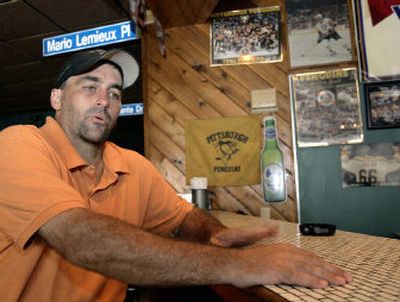Cold comfort

COLUMBUS, Ohio — Bartender Paul Lewis used to pay his college tuition with the $600 in tips he made nightly when the Columbus Blue Jackets played next door.
But when last year’s hockey season was lost to the NHL lockout, business dropped so drastically at O’Shaughnessey’s Public House that Lewis, 23, took a job at a Colorado ski shop.
With the stalemate’s end in sight, restaurants, bars and hotels clustered near hockey arenas are assessing the damage, calling back workers to resurrect shifts and cooking up drink discounts and other promotions to lure back fans.
“The hockey season is a long season,” sighed Patrice Verrall.
Verrall, manager of the Comfort Suites in Buffalo, N.Y., said she saw the biggest impact during winter weekends, when out-of-town Sabres fans would have stayed in the hotel near the HSBC Arena.
In many cities, professional hockey arenas anchor entertainment districts and surrounding sports-themed bars and restaurants. Although many facilities double as basketball arenas and concert venues, some business owners say it’s not the same.
“Hockey fans are great for celebrating before a game and after a game,” said Paul Wilson, general operations manager for Hurricane O’Reilly’s owner, Glynn Hospitality Group. The Boston pub near the TD Banknorth Garden caters to Bruins fans.
Without hockey to put customers in their seats, restaurants and bars closed early and laid off workers or didn’t hire usual seasonal staff.
“It was all hockey,” said Dave Sypherd, manager of The Souper Bowl, a Pittsburgh bar and restaurant that usually draws Penguins fans and cut staff from 12 to five. “We close early now because there’s no hockey.”
The Fours, an English-style sports pub near the Boston arena, halted renovations when the lockout began. In anticipation of the new season, manager Fran Manganiello said she’s installed two new plasma TVs.
While NHL officials said it was too early to estimate total team revenue losses, financial reports of some teams give a hint. The New Jersey Sports and Exposition Authority, which owns the Continental Airlines Arena, said canceled Devils’ games contributed to a 5 percent decline in revenue last year.
Cablevision Systems Corp., owner of Madison Square Garden and the New York Rangers, said first quarter revenue fell 12 percent but the drop was offset by the decline in expenses.
Some business owners worry the lockout may have destroyed hockey’s fan base. Dave Allsbrooks said he ran to tell his boss about the agreement Wednesday but has since reined in his excitement.
“Honestly, I still don’t believe it until they open up next door and drop the puck,” said Allsbrooks, general manager at the Frog, Bear & Wild Boar Bar in Columbus’ trendy Arena District.
Nashville Predators jerseys and caps stopped moving almost entirely at Game Day Collectibles in the Predators’ Tennessee hometown, owner Jeff Morrill said.
That’s made Morrill wonder whether he should bother stocking hockey memorabilia in an expansion city with an already-tentative fan base.
“Hockey’s not football,” he said. “I’m not sure it’s going to come back.”
Franchises are doing what they can to bring it back. The Dallas Stars announced an average $11 drop in ticket prices, and the New York Islanders will make 30,000 tickets available for only $10 each. Many other clubs are considering dropping prices, NHL officials said.
“Coming out of the gates, I think we’re going to have to do something for them,” said Charlie Jacobs, executive vice president of Delaware North Cos., which owns the Bruins. “I think people will expect a kinder, gentler, more user-friendly NHL — more access to our players, more family-friendly events, games for the kids.”